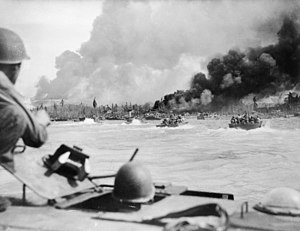| Battle of Balikpapan (1945) | |||||||
|---|---|---|---|---|---|---|---|
| Part of the Pacific Theatre of World War II | |||||||
 American manned Alligators during the landing of Australian troops at Balikpapan, Borneo | |||||||
| |||||||
| Belligerents | |||||||
|
|
| ||||||
| Commanders and leaders | |||||||
|
|
| ||||||
| Strength | |||||||
| 33,000 |
3,100 – 3,900 soldiers 1,100 – 4,500 armed labourers | ||||||
| Casualties and losses | |||||||
|
229 killed 634 wounded |
2,032 killed 63 captured. | ||||||
The Battle of Balikpapan was the concluding stage of Operation Oboe, the campaign to liberate Japanese-held British and Dutch Borneo. The landings took place on 1 July 1945. The Australian 7th Division, composed of the 18th, 21st and 25th Infantry Brigades, with a small number of Netherlands East Indies KNIL troops, made an amphibious landing, codenamed Operation Oboe Two, a few miles north of Balikpapan. The Allied invasion fleet consisted of around 100 ships. The landing had been preceded by heavy bombing and shelling by Australian and US air and naval forces. The Allied force totalled 33,000 personnel and was commanded by Major General Edward Milford, while the Japanese force, commanded by Rear Admiral Michiaki Kamada, numbered between 8,400 and 10,000, of which between 3,100 and 3,900 were combatants. After the initial landing, the Allies secured the town and its port, and then advanced along the coast and into the hinterland, capturing the two Japanese airfields. Major combat operations concluded around 21 July, but were followed by mopping-up operations, which lasted until the end of the war in mid-August. Australian troops remained in the area until early 1946.